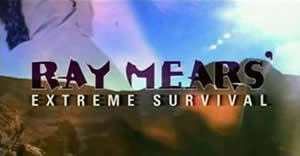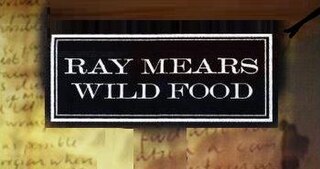Survivalism is a movement of individuals or groups who actively prepare for emergencies, including possible disruptions in social or political order, on scales from local to international. Survivalism also encompasses preparation for personal emergencies, such as job loss or being stranded in the wild or under adverse weather conditions. The emphasis is on self-reliance, stockpiling supplies, and gaining survival knowledge and skills. Survivalists often acquire emergency medical and self-defense training, stockpile food and water, prepare to become self-sufficient, and build structures such as survival retreats or underground shelters that may help them survive a catastrophe.

The National Outdoor Leadership School (NOLS) is a non-profit outdoor education school based in the United States dedicated to teaching environmental ethics, technical outdoors skills, wilderness medicine, risk management and judgment, and leadership on extended wilderness expeditions and in traditional classrooms. The NOLS mission is to be the leading source and teacher of wilderness skills and leadership that serve people and the environment. NOLS runs courses on six continents, with courses in a variety of wilderness environments and for almost any age group.

The Air Training Corps is one of the three corps in the New Zealand Cadet Forces, the other two being the Sea Cadet Corps and New Zealand Cadet Corps. It is funded in partnership between the RNZAF and communities, and its members are civilians. Members have no obligation to head into the regular force, however some do choose to join the New Zealand Defence Force. Unlike the United States Civil Air Patrol, service as an ATC cadet does not translate into higher pay, rank, or seniority in the NZDF.

Survival skills are techniques that a person may use in order to sustain life in any type of natural environment or built environment. These techniques are meant to provide basic necessities for human life which include water, food, and shelter. The skills also support proper knowledge and interactions with animals and plants to promote the sustaining of life over a period of time. Survival skills are often associated with the need to survive in a disaster situation. Survival skills are often basic ideas and abilities that ancients invented and used themselves for thousands of years. Outdoor activities such as hiking, backpacking, horseback riding, fishing, and hunting all require basic wilderness survival skills, especially in handling emergency situations. Bushcraft and primitive living are most often self-implemented, but require many of the same skills.

The New Zealand Cadet Corps, is one of the three corps in the New Zealand Cadet Forces, the other two being the Air Training Corps, and Sea Cadet Corps. There is no reference to the Army within the official title of the NZCC, but an army theme is used for the NZCC. All of its members, from the cadets themselves to the officers and the support committees are civilian volunteers. Members have no obligation to head into the New Zealand Defence Force (NZDF); however, some do choose to join the NZDF.

Mors Kochanski is a Polish Canadian bushcraft and wilderness survival instructor, naturalist, and author. He has acquired an international following and has instructed for both military and civilians in Canada, the US, the UK and Sweden. He is well known for saying, "The more you know, the less you carry."
Les Stroud is a Canadian survival expert, filmmaker and musician best known as the creator, writer, producer, director, cameraman and host of the television series Survivorman. After a short career behind the scenes in the music industry, Stroud became a full-time wilderness guide, survival instructor and musician based in Huntsville, Ontario. Stroud has produced survival-themed programming for The Outdoor Life Network, The Discovery Channel, The Science Channel, and YTV. The survival skills imparted from watching Stroud's television programs have been cited by several people as the reason they lived through harrowing wilderness ordeals.
Community education, also known as community-based education or community learning & development, is an organization's programs to promote learning and social development work with individuals and groups in their communities using a range of formal and informal methods. A common defining feature is that programmes and activities are developed in dialogue with communities and participants. The purpose of community learning and development is to develop the capacity of individuals and groups of all ages through their actions, the capacity of communities, to improve their quality of life. Central to this is their ability to participate in democratic processes.

Extreme Survival is a survival television series hosted by Ray Mears. The series airs on the BBC in United Kingdom, it is also shown on Discovery Channel in the United States, Canada, India, Italy, Brazil, New Zealand, Australia, Norway, Sweden, Denmark, the Netherlands and Russia, where he demonstrates his wilderness skills and presents tales of survival from some of the world's most difficult environments. The show was first broadcast in 1999, after the success of World of Survival from 1997–1998, and ended in 2002.
The term woodcraft — or woodlore — denotes skills and experience in matters relating to living and thriving in the woods—such as hunting, fishing, and camping—whether on a short- or long-term basis. Traditionally, woodcraft pertains to subsistence lifestyles, with implications of hunting-gathering. In more recent times, and in developed countries, it relates more to either outdoor recreationalism or survivalism.

Ray Mears' World of Survival is a survival television series hosted by Ray Mears. The series airs on the BBC in United Kingdom, it is also shown on Discovery Channel in the United States, Canada, India, Italy, Brazil, New Zealand, Australia, Norway, Sweden, The Netherlands and Russia. The show was first broadcast in 1997 with "The Arctic", and ended in 1998. It would be followed by Extreme Survival.

Bushcraft is a survival television series hosted by Ray Mears. The series airs on the BBC in United Kingdom, it also shown on Discovery Channel in the United States, Canada, India, Italy, Brazil, New Zealand, Australia, Czech Republic, Norway, Sweden, The Netherlands, Romania and Russia. Following on from Extreme Survival, Bushcraft was first shown in 2004, and ended in 2005.

Wild Food Documentary is a documentary television series hosted by Ray Mears. The series airs on the BBC in United Kingdom, it is also shown on Discovery Channel in the United States, Canada, India, Italy, Brazil, New Zealand, Australia, Norway, Sweden, The Netherlands and Russia. The show was first broadcast with an episode set in Australia and ended with "Woodland". The theme tune is not unlike the one heard in World of Survival.

Survival with Ray Mears is a 3 part television series hosted by Ray Mears, as he tracks predators in their natural habitats. The series was broadcast by ITV, and was billed as the return of the Survival brand. It was followed by Wild Britain with Ray Mears.

Cody Lundin is a survival instructor at the Aboriginal Living Skills School in Prescott, Arizona, which he founded in 1991. There he teaches modern wilderness survival skills, primitive living skills, urban preparedness, and homesteading. Lundin was also a former co-host of Discovery Channel's reality television series, Dual Survival.
David Michael Canterbury is a survival expert who co-starred on the reality television show Dual Survival for two seasons (2010–11) which aired on the Discovery Channel. He is also an author, publishing Bushcraft 101 in 2014, Survivability for the Common Man (2011), and Advanced Bushcraft (2015). In 2015 Canterbury co-starred in a survival series called Dirty Rotten Survival, which aired on the National Geographic Channel.
Andrew Thomas Price is presenter of the ITV Cymru Wales programme Coast & Country. The series began in October 2013.

Bruce Duncan Zawalsky is a professional Canadian outdoorsman, Bushcraft instructor and author. He founded and owns the Boreal Wilderness Institute based in Edmonton, Alberta. He is the author of A Guide to Canadian Wilderness Survival published by Liard Books in 2017. Zawalsky guided his first backpacking group in the Rocky Mountains in 1981. In 1989, as part of a small six-person group in three canoes, he completed a 92-day 3,600 km canoe expedition between Rocky Mountain House, Alberta and Thunder Bay, Ontario. The expedition involved over 60 portages and 200 km of upstream river paddling, lining and poling, and was conducted as the completion of an Outdoor Education training program at the University of Alberta. He studied with the famed bushcraft expert Mors Kochanski, and at Augustana University College, PADI College, the Nordic Ski Institute and in the Canadian military. He has been a member of the Loyal Edmonton Regiment for more than 34 years.













